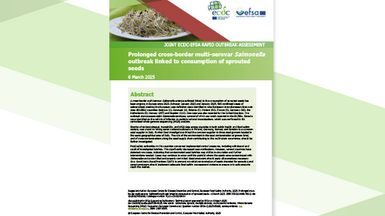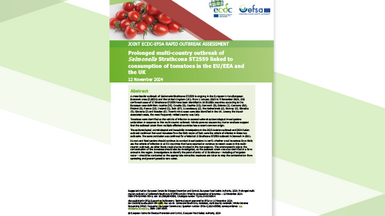Update - Outbreak of Legionnaires’ disease in a hotel in Calpe, Spain, November 2011 – May 2012
Following notification of new cases of Legionnaires’ disease, all associated with the same hotel in Spain, ECDC has updated its assessment of the risk to the EU published in February 2012.
It concludes that in the absence of an identified and controlled source of Legionella, there may be an ongoing risk of exposure to Legionella for hotel guests and persons working at the hotel.
Executive Summary
In February 2012, ECDC issued a rapid risk assessment on the outbreak of travel-associated Legionnaires’ disease that occurred in a hotel in Calpe, Spain. Following the notification of four new cases since the control measures were implemented in February, ECDC updates its risk assessment.
The outbreak has been ongoing since November 2011 and is associated with a hotel in Calpe, in the province of Alicante, Spain. To date, it has resulted in 25 cases, including six deaths.
22 cases of travel-associated Legionnaires’ disease (TALD) have been notified to the ELDSNet Surveillance Network. In addition, three hotel staff presented with Legionnaires’ disease. Onset of illness occurred between November 2011 and May 2012.
The TALD cases involved residents from the United Kingdom (16 cases), Spain (3 cases), France (2 cases) and Belgium (1 case). The average age of the cases is 73 years (min 44-max 89) and the gender distribution is 11 males/ 11 females.
The hotel was closed from 2 to 10 February 2012 and the spa installations have been closed between 8 and 13 May. Epidemiological investigations of the last four cases are currently ongoing.
As Legionnaires’ disease cannot be transmitted from human to human, the risk for the EU remains limited to staff of the hotel and visitors present during the last three weeks. According to Spanish authorities, tour operators have been asked to inform all tourists that stayed at the hotel from mid April until May about the need to consult a physician should symptoms appear. Current and future visitors to the hotel should be provided with relevant information, both to ensure quick diagnosis and treatment and to make them aware of the risks identified during investigations.
Legionnaires’ disease is a potentially fatal infectious disease which tends to be under-diagnosed and under-reported. Early treatment of patients is important and health care providers should be reminded to consider this disease when ascertaining patients presenting with pneumonia, to enquire about recent travel, and to notify the relevant public health authorities of their country.







